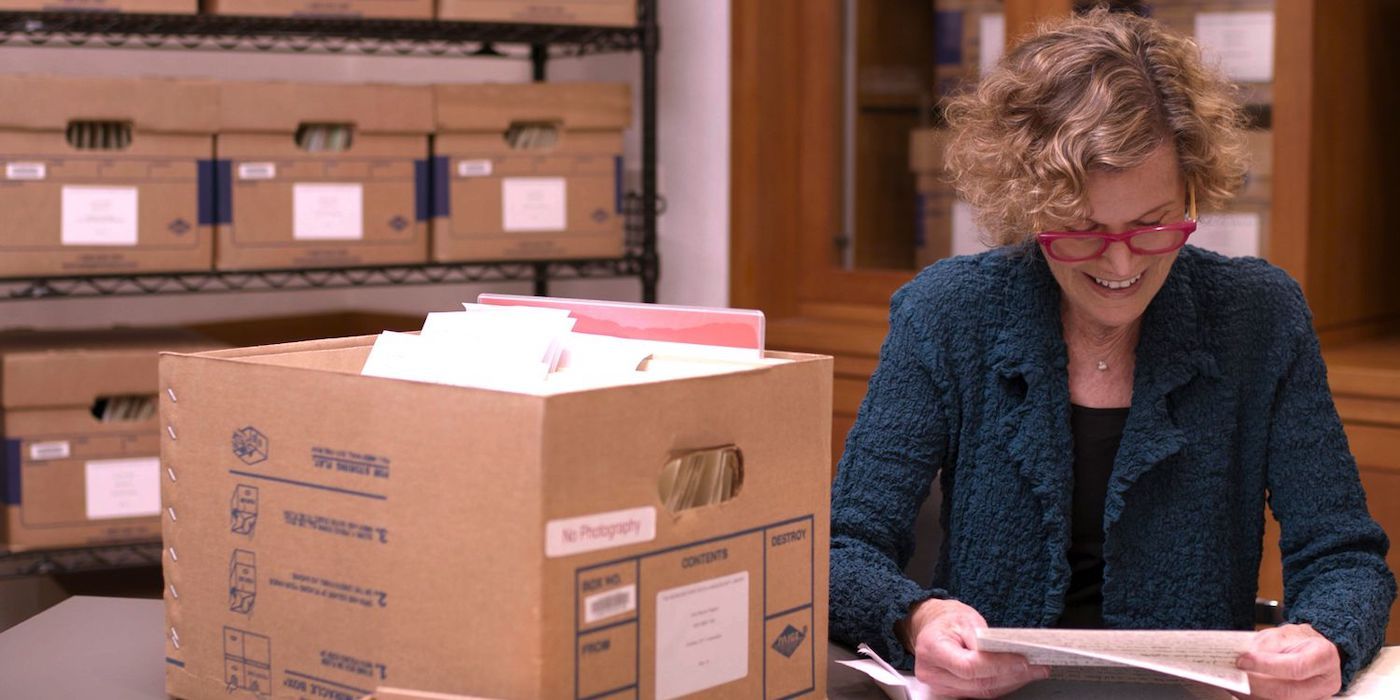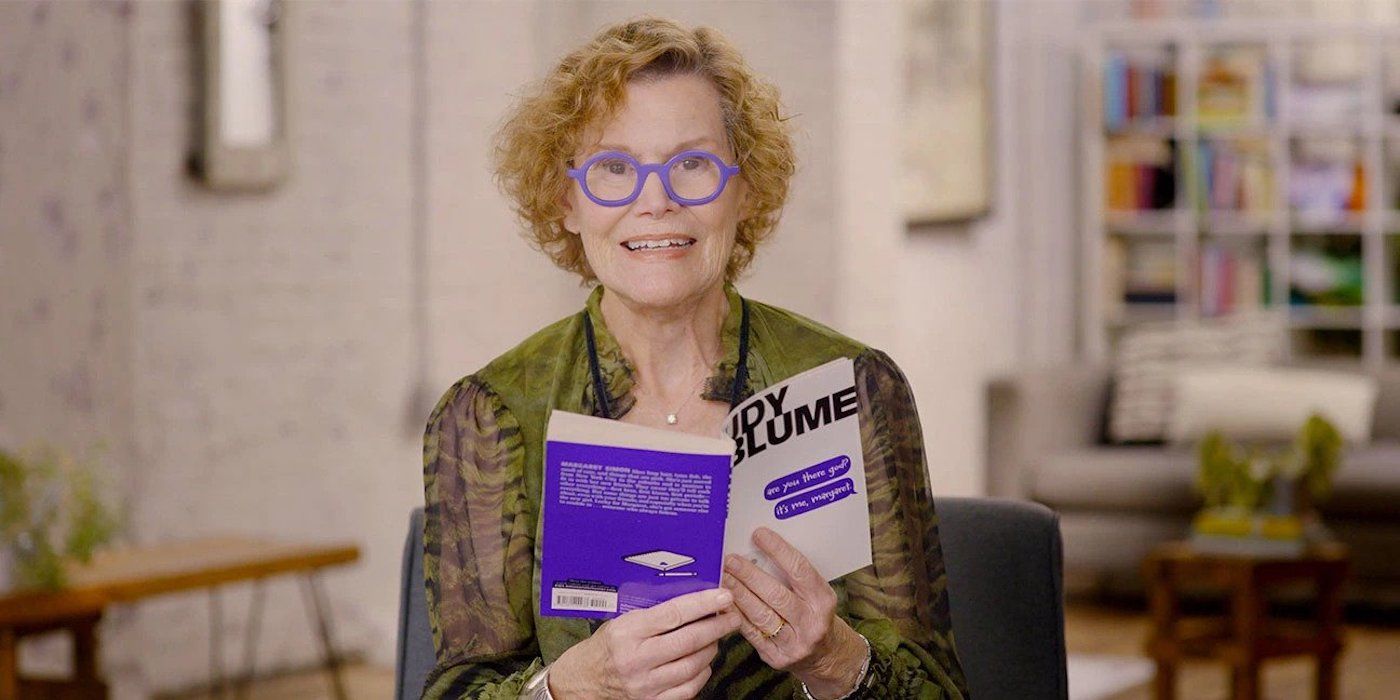[ad_1]
After decades of simultaneously being on bestseller lists and being a target for book censorship, it is a wonder how it took this long for a documentary to be made about Judy Blume.
Judy Blume Forever starts with the author reading an excerpt from her novel, Deenie, that discusses sexuality. The scene features a teacher explaining masturbation to her students, saying it is not something they should be afraid of. As Blume wraps up reading the passage, she exclaims to the room, “Let’s raise our hands if we masturbate, everybody!” She waves her arms in the air and raises her own hand in celebration. Laughter is heard from behind the camera as she smiles, playfully shaking her head at herself and her refreshing frankness.
Who Is Judy Blume?
Writer of your younger selves’ favorite books like Tales of a Fourth Grade Nothing and the Fudge series, Judy Blume and her stories have been a comfort and support system for people of all ages since the 1970s. She is well-known for speaking honestly about topics often considered sensitive, such as puberty and sexuality.
While she has books for people of all ages, Blume’s work revolves around growing up and the lessons to be learned along the way and has paved the way for the young adult genre. Whether it be fascination surrounding menstruation in Are You There, God? It’s Me, Margaret, or navigating sex in a first relationship in Forever…, Blume has been able to capture emotions unique to specific life events in an honest and often humorous way.
Due to her candor in her books for younger people, Judy Blume is also one of “the most censored writer(s) of children’s books,” according to the documentary. Inspired by her own early life, her books often include scenes reminiscent of many people’s childhoods that might otherwise make them squirm, such as discussing puberty in school for the first time and obsessing over getting a larger bust size. Rather than view these moments in everyone’s life as strange or shameful, Blume has allowed readers to be more forgiving towards themselves and others by leaning into the humor and awkwardness.
Similar to many, Blume grew up not feeling comfortable asking questions about changing bodies and discovering sexuality, especially with her parents. She was, however, able to confide in friends about many things, except lying about getting her period, a moment that makes its way into the book and now film adaptation of Are You There, God? It’s Me, Margaret. The new film adapted from Blume’s work is about Margaret, who struggles to find herself amidst confusion about puberty and religion. The young girl begins to confide in God due to the lonely feelings both of these topics bring on.
The publishing of the novel in 1970 ended up cementing Blume as a universal confidant for many young readers, receiving letters and maintaining years-long correspondences with young people looking for advice and someone who would listen to them. Many of the kids that wrote to her at the time of the book’s release described feeling seen when it came to things that they felt they could not discuss with anyone else, such as menstruation and sex. According to the documentary, a young Blume felt that adults were always keeping secrets from children. Once she entered adulthood, Blume became the comforting and familiar, yet unknown friend that young people could be vulnerable with, especially in a world in which adults still downplay and laugh at kids’ problems and struggles.
Judy Blume’s Long History With Censorship
Despite being a help and revelation to young people, many adults had difficulty with the existence of Blume’s novels. In the present day, people still feel threatened by Blume’s work with the recent rise in book banning. When faced with horror and judgment regarding the sincerity and realness of her books and characters, Blume did not and continues to not back down, displaying perseverance that she had gained from moments throughout her life. Growing up in the 1950s, a time Blume says was about playing “pretend,” she was surrounded by people who did not openly express their emotions. Once she discovered her love for writing, she was told by someone in the field that she was not good enough. After finally getting published, she was not taken seriously. The rise in her popularity is when the judgment was amplified, and the content of her books and her support of organizations like Planned Parenthood and the National Coalition Against Censorship led to death threats. Yet the documentary shows adults and children alike thanking Blume, gushing about how her books changed their lives and made them feel seen after feeling lost.
The arrival of censorship in the 1980s, however, did have an effect on the accessibility of her novels. Her writing was often removed from libraries along with other literature that was viewed as even remotely provocative. According to the documentary, this even included dictionaries. The criticism towards frankness of sexuality and pleasure did not stop at her books for young people. Even books for adults that featured honest looks into the characters’ sex lives were deemed “gratuitous” and called “filth.” Archival footage from the documentary showed politician and political commentator Pat Buchanan condemning Blume for the heavy inclusion of “bodily functions,” including everything from sex to throwing up.
More footage shows adults angrily shouting into microphones at meetings, many of them disturbed and offended by brief mentions of masturbation in Deenie, a coming-of-age novel about navigating disabilities and mother-daughter relationships. The immediate rejection of sexual content, with many critics never having read the novels in their entirety, means missing out on the prominent life lessons presented by Blume. This also means not allowing themselves to feel empathy and appreciate the significance of a young girl discovering her sexuality on her own accord after being recently diagnosed with scoliosis, a theme that pushes back against more ableist stereotypes.
The Present-Day Rise in Book Banning
In the present day, book censorship is at an all-time high with no signs of slowing down. The conversation around censorship and banning books, both in the 1980s and today, disregard the intelligence, capability, and autonomy of readers, especially young people. What makes Blume’s novels so charming is their feature of complex characters, who are finding their way and displaying intelligence simultaneously. Her writing never insults the abilities of her young readers or makes them feel small.
Judy Blume grew up under pressure to be the perfect girl, being told to meet her husband at college and have a degree in case she ever “had to work.” Amidst not aligning with these expectations, she felt lost. Blume understands that feeling lonely and confused is not unique, but is a universal experience that is not just felt during youth. She knew what she wrote in her books was controversial, yet she went through with it all anyway. This is why her writing, as well as Blume herself, is so important in the topic of censorship and the act of fighting it. Is it fair to say some of Blume’s novels are not appropriate for young children? Yes. However, it is unethical and dangerous to take away stories as if they do not exist, as well as remove reading material from public places.
The documentary showing liberation movements in the 1970s right before a rise in censorship in the 1980s emphasizes how confusing it is to think of what has now led to banning critical race theory in schools today and attempts to censor education on puberty and menstruation for those who get their period. This is especially the case when authors like Blume helped lay the groundwork for openness and honesty with some of these topics so many years ago.
Even with authors’ work being banned for its directness on gender and sexual orientation, Blume’s work and career remind audiences that creative expression remains an emotional outlet. All the children that still read Blume today describe relating to the young, complex, and autonomous characters that were written over 30 years ago. These novels treat children like real people and do not laugh at them when they are inquisitive or curious. Books that do not punish a girl for having sex and present a realistic view of children going through puberty are important in how people view and treat each other, a problem that will grow worse with the rise in censorship. It is no coincidence that Blume felt uncomfortable growing up and asking questions about her body during a time in which everyone was pretending that everything was okay. In fact, those circumstances are what birthed Judy Blume and her inspiring, contagious vulnerability that people are still trying to extinguish. Creating an unsafe environment and attempting to ban the talk of these pics will not snuff out intelligence or curiosity.
While Blume has taught readers many lessons over the years, such as not taking life too seriously, she also represents the positive effects of being honest and real. There is a reason she gained so many young pen pals after being published. Kids and young adults found a friend in her, with some of them signing “I love you” at the end of their letters. Blume continues to make people feel pride instead of shame about their decisions while navigating different situations, whether it be about sex or grief. Her stories have inspired decades of conversation on the desire to ban discussion of important topics, or why some people make the argument more complicated due to fear of simple truths.
Since her days of publishing books are over, Blume has opened up a bookstore in Florida, decorating the space with signs that proudly state, “I Sell Banned Books.” Blume, along with many others, sees that reading and learning about one another will lead to more understanding. After all, as Blume said in a letter to a reader, “‘We are all human, and the more learn about each other, the better we’ll be able to get along.’”
[ad_2]
Source link
Armessa Movie News

